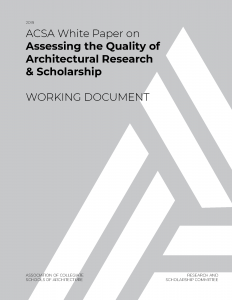ACSA White Paper
Working Document Overview
Architecture is a diverse discipline that draws from a variety of areas of interest. With its own practices, activities, and measures for assessing quality. This diversity of faculty areas of expertise and their research, scholarship, and creative activities presents challenges to schools of architecture in developing policies and standards for assessing the quality of these activities that respect and support all their faculty. It also makes it difficult for the faculty themselves to effectively frame their own work and objectively demonstrate its quality to external audiences within the discipline and beyond. Administrators in schools of architecture also frequently face challenges in presenting the work of their schools and faculty to university administrators. Currently, there is a lack of consensus within the discipline regarding the best approach for assessing the diverse work of architectural faculty.
This report explores the topic of assessing the quality of research, scholarship, and creative activities in architecture and related fields. The report aims to respond to the growing need in schools of architecture for a standard disciplinary approach for objectively assessing the quality of research, scholarship, and creative activity in order to effectively meet the needs of the wide variety of research paradigms, forms of investigation, modes of dissemination, and peer assessment typically found within the work of architectural faculty and sometimes within the work of a single faculty member. This diversity and lack of agreed upon disciplinary norms for quality assessment currently pose challenges for schools of architecture, architectural administrators, and faculty in general.
The report represents the outcome of the work of the ACSA Research + Scholarship Committee. The committee is charged by the ACSA board with leading ACSA’s efforts to support faculty in scholarly endeavors. Over the last two years, the committee has worked to address issues related to the diversity of approaches to research and scholarship in the discipline of architecture. In 2017, the committee produced a White Paper on Tenure and Promotion that developed a classification of the different areas of expertise of architectural faculty as well as the different modes of production and evaluation that faculty typically utilize. In 2018, the committee produced a report on the role of STEM in architectural education and research which included a survey of funded research activities in ACSA member schools. This year, the committee was charged with developing a review of institutional measures of quality in research, as judged both within and outside the discipline.
The current report builds on the the previous work of the committee within the promotion and tenure white paper. In particular, the report is based on the classification of modes of production and evaluation developed in the white paper. These modes of production are used as the starting point for the review included in this report. These modes of production include: curation, funding, practice recognition, publication, and public presentation. This report adds community engagement as a sixth mode of production and evaluation in recognition of the increasing prevalence and significance of these activities in schools of architecture as well as the challenges that typically face faculty working in this area in framing their work with any of the more conventional modes of production.
Kelly Bair, University of Illinois at Chicago
Corey Griffin, Pennsylvania State University
Marc J Neveu, Arizona State University
Hazem Rashed-Ali, University of Texas at San Antonio (Chair)
Anne-Catrin Schultz, Wentworth Institute of Technology
Kentaro Tsubaki, Tulane University
Marci Uihlein, University of Illinois at Urbana-Champaign
Staff: Eric Wayne Ellis, ACSA Senior Director of Operations and Programs
Eric W. Ellis
ACSA, Director of Operations and Programs
202-785-2324
eellis@acsa-arch.org

 Study Architecture
Study Architecture  ProPEL
ProPEL 
